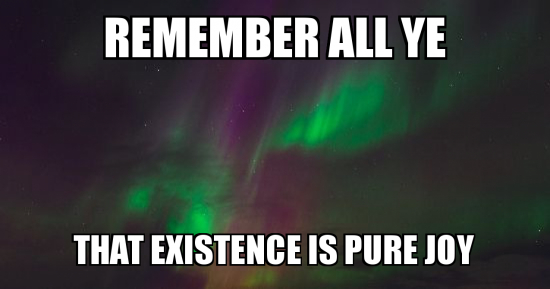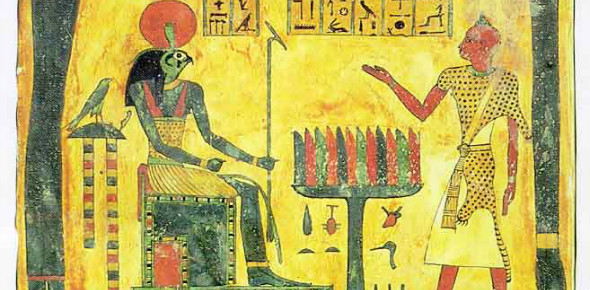Hadit speaks: “Remember all ye that existence is pure joy.” It is the high holy days for Thelemites. Today we commemorate the reception of Chapter 2 of the Book of the Law by Aleister Crowley and Rose Kelly Crowley on April 9 1904.
The play of Nuit and Hadit is a love story. It is the love story, the one in which the universe is created, played out in the loves of all the goddesses and gods. This love story plays out in our lives as well; we are all stars on a journey through incarnation to realize our divine nature, and that journey is fueled and guided by love.
In the Gnostic Mass the priest says to the priestess “Thee therefore whom we adore we also invoke.” The priestess replies to the invocation with the words of Nuit: “But to love me is better than all things.” As the priestess I receive the invocation, speak the words, calling out to her lovers, “To me, to me!” I represent the beloved who invites the magician-lover to unite with the divine in love.
I come to Thelema to be loved, but I also come to Thelema to love. I too am a magician, a soul on the journey of discovery. I hear the voice of Nuit as the voice of the mother. She summons me, she loves me, I am included in this. But I do not hear in her the voice of the lover. I long for a ritual which places Hadit as the divine lover lifting me to the stars.
I am inspired by the great love stories of the world. There at the beginning of history is Inanna, singing of her shepherd lover Dumuzi: “My honey man, my honey man sweetens me always. My lord, the honey-man of the gods, he is the one my womb loves best. His hand is honey, his foot is honey, he sweetens me always.” Dumuzi sings in response: “Oh lady, your breast is your field. Inanna, your breast is your field. Your broad field pours out plants. Your broad field pours out grain. Water flows from on high for your servant. Bread flows from on high for your servant. Pour it out for me, Inanna. I will drink all you offer.”
In the festal scroll for Pesach (Passover) there is the Shir HaShirim, the Song of Songs, so erotic as to be circumscribed with prohibitions, but so beautiful as to be indispensable. She sings: “As the apple tree among the trees of the wood, so is my beloved among the sons. I sat down under his shadow with great delight, his fruit was sweet to my taste. He brought me to the banquet hall. His banner over me is love. Strengthen me with raisins, refresh me with apples; for I am faint with love.”
In the Song of Songs he sings to her: “You have ravished my heart, my sister, my bride. You have ravished my heart with one of your eyes, with one chain of your neck. How beautiful is your love, my sister, my bride! How much better is your love than wine! The fragrance of your perfumes than all kinds of spices! Your lips, my bride, drip like the honeycomb. Honey and milk are under your tongue.”
There is the poet Jayadeva telling the story of Krishna, a country youth who dances with all the milkmaids and lays with them one after another. After her first night with him Radha remembers Krishna: “Such spilling sweetness from his flute and lips, and tremulous the movement from his cheeks…How tenderly he treated me, as on my breast he quietly lay asleep; to me alone he gave his arms and kisses, played and drank there fully at my lip.” The next night she lies alone, tormented with the thought that some other milkmaid is enjoying his kisses.
To his surprise Krishna desires no others. He too lies alone, remembering Radha: “That arched brow hurts me with its loosened arrows, breath deserts me in those coils of hair, all consciousness dissolves at those red lips, and life’s a plaything at those rounded breasts. A touch, her comfort in it, play of eyes, that mouth, its fragrance…”
Krishna sends for Radha, Radha refuses to go, and finally Krisha comes to her and the burning desire of their separation washes away in their joy. “Pressed round by arms, by breasts, by fingernails, by pounding hips, by teeth on lips, his head pulled down but mad to have the honeyed stream…”
Nuit and Hadit sing to each other as well, across the vast expanse of space, across the ages. Nuit sings: “Be thou Hadit, my secret centre, my heart & my tongue!” And again: “For I am divided for love’s sake, for the chance of union. This is the creation of the world, that the pain of division is as nothing, and the joy of dissolution all.”
Hadit sings: “Blue am I and gold in the light of my bride: but the red gleam is in my eyes; & my spangles are purple & green. Purple beyond purple: it is the light higher than eyesight.” And again: “I am the secret Serpent coiled about to spring: in my coiling there is joy. If I lift up my head, I and my Nuit are one. If I droop down mine head, and shoot forth venom, then is rapture of the earth, and I and the earth are one.” And finally: “Remember all ye that existence is pure joy; that all the sorrows are but as shadows; they pass & are done; but there is that which remains.”
I dream of the blue and gold snake, glinting with green and purple, coiled and waiting to rise.
To Hadit.



